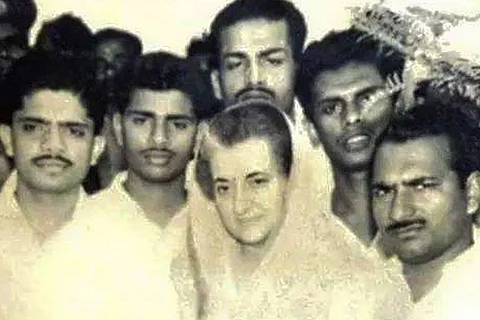

As the Kerala Assembly celebrates its Diamond Jubilee, the state might seem settled in its stable and predictable bipolarity. Alternating almost automatically between the LDF and the UDF every five years, Kerala’s politics today reveals little of the tumult of its earlier years. But, as a look back at the state’s history reveals, Kerala walked a long, hard road to this settled pattern.
The Kerala Chronicles looks at some of the fascinating ups and downs, triumphs and tumults of Kerala politics, since the state’s birth in 1956 to the current day.
For the current generation, AK Antony presents the image of the ardent, obedient Congressman, singularly dedicated to the party and its ruling Gandhi family. Indeed, just recently, Antony told an audience in Thiruvananthapuram that Indira Gandhi was the ideal role model for younger leaders, who should all try to emulate her example.
For those who have only seen this newer Antony, the strong-willed leader who was one of Indira Gandhi’s most vociferous opponents in the late 1970s will likely come as a big surprise. Antony even quit the post of Chief Minister of Kerala in 1977, purportedly due to his anger over Congress support for Indira Gandhi post-Emergency.
Antony did not start out as implacable foe to Indira Gandhi in her early years in politics. When Indira Gandhi first rose to lay claim to Congress leadership in 1969, Antony, along with Vyalar Ravi, was one of the few leaders to pledge his support for her early on.
When Indira Gandhi declared Emergency in 1975, however, the support had soured. At the height of the Emergency, most Congress leaders had capitulated to Indira’s command, and were in agreement with her 1976 decision to postpone withdrawing the Emergency and conduct of elections for a further year in order to ‘consolidate’ the gains that had been achieved till then.
At the Guwahati session of the All India Congress Committee that year, Antony and Priya Ranjan Dasmunsi were perhaps two of the only leaders to “flatly criticise” the use of Emergency powers by Indira Gandhi and the rise of the Sanjay wave.
According to contemporary US diplomatic cables, made public in 2013 by Wikileaks, Antony, then the President of the Kerala unit of the Congress, had criticised Sanjay’s “rapid ascent to a position of power”, and had asked, "What sacrifices he has made for the party or the country". Antony had also demanded that fresh elections be held in the country as soon as possible.
When the K Karunakaran government was forced to resign on April 25, 1977, over Emergency excesses in the Rajan disappearance case, the obvious choice for the next Kerala CM was Antony. He was sworn in on April 27 as the youngest Chief Minister of the state till then.
Antony then contested and won the Kazhakoottam bye-election, where the Rajan case still remained the primary election issue, despite Karunakaran’s resignation over it. Remarkably, Antony secured the seat even though Rajan’s father, Eachara Warrier, campaigned for the CPI (M) candidate Sreedharan Nair. In this, Antony’s vocal opposition to Indira Gandhi surely played a role.
Even as then AICC President Brahmananda Reddi and Congress Parliamentary Party leader YB Chawan rushed to congratulate Antony, Indira maintained a conspicuous silence.
The situation grew to its peak when Indira Gandhi, who had suffered a major defeat in the 1977 elections and was looking to forge a comeback trail, sought reelection in Karnataka’s Chikmagalur constituency in 1978. The announcement of her candidature for Chikmagalur, received widespread support from Congressmen across the country, including from the KPCC faction under Antony’s leadership.
Once again, though, Antony stood out as a singular critic of the former PM. Pointing to the recent Congress loss in a bye-election in the Trivandrum East constituency, Antony called it Indira Gandhi’s Waterloo moment, though the Congress (I) candidate had beaten his own faction’s candidate.
And, sending shockwaves across the country, Antony resigned from the post of Chief Minister on October 27, protesting the Congress Working Committee’s call for indirect support for Indira Gandhi.
According to some reports from the time, Antony’s decision may not have been entirely devoid of self-interest, faced as he was by the shrinking popularity of his own coalition versus both the CPI (M) and the Karunakaran faction that supported Indira Gandhi. The timing of his resignation, these reports argue, allowed him to claim the moral high ground.
Antony, however, claimed in a 1978 interview to India Today, that the differences were ideological. “We admit that there were excesses during the Emergency. We want to correct them. This is the position taken by the Congress. We want that in future it should not be possible for anyone to declare Emergency except in conditions of war. There should be no such thing as an internal Emergency. In other words, we are admitting our mistakes, whereas they (Indira Gandhi and her supporters) are not prepared to do so,” Antony had said.
Following the 1980 elections to the Kerala Assembly, Antony even went to the extent of extending his support to the CPI (M)-led government of EK Nayanar. With the entry of Rajiv Gandhi to politics, however, Antony’s antipathy to the grand old party softened. Quickly forming a friendship with Rajiv, Antony abandoned Nayanar to return to the Congress fold, calling it his “grand homecoming”.